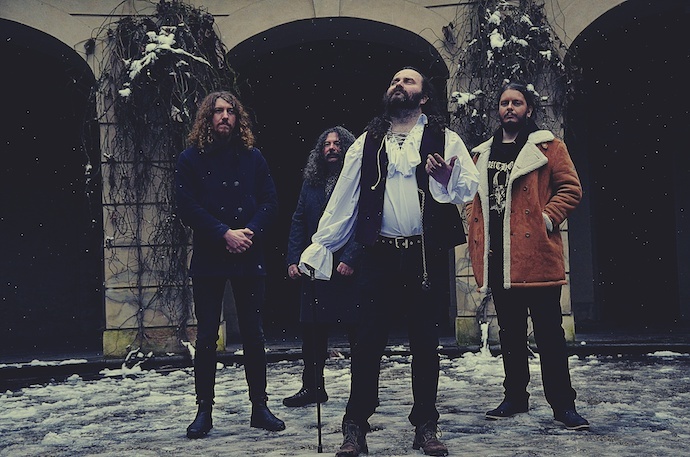
(We’re extremely pleased to present a great discussion between our Comrade Aleks and Malokarpatan‘s Adam Sičák, an interview that delves into the band’s past, present, and possible futures.)
The Slovakian band Malokarpatan is well-known to those who appreciate authentic old-fashioned metal. They combined proto-black and heavy metal with avant-garde themes and told grim stories taken from native folklore and history.
The first nine years of Malokarpatan‘s career were full of recordings and gigs, but now with the release of the fourth album Vertumnus Caesar, they’re going to focus only on the composition of the new material.
We interviewed the band’s mastermind Adam Sičák about two years ago (here) and covered the band’s entire discography which consists of three albums at the moment. Now it’s time to discuss Vertumnus Caesar, and Adam always has a few good ideas to share.
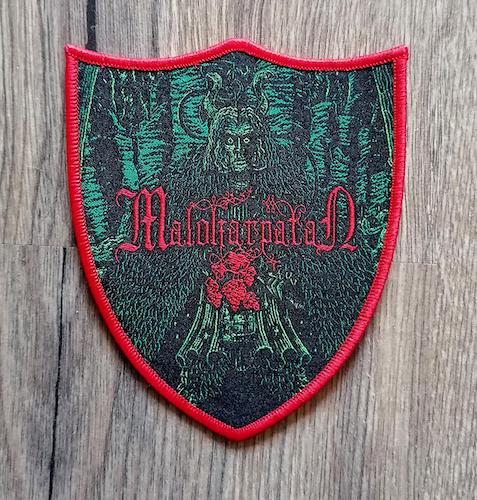
Hi Adam! How are you doing? What’s the band’s current status?
Hi Aleks! Doing good, I’m soon off for a little winter holiday and after that there’s more winter solstice festivities coming. We aren’t doing any live shows for this album as it has way too many extra layers and arrangements which would be a logistical nightmare to put together, so I’m already writing the next record instead. I just wish I wouldn’t have to answer the same e-mails again and again about live shows.
Yes, I saw and heard that besides guests you recorded extra instruments for Vertumnus Caesar: delicia, glockenspiel, stylophone and melody harp, and Axel used the great arsenal as well. Did you already know that it would be too hard to perform the album live when you started to compose the first songs?
Actually not at all! As odd as that will sound, I first started writing the album as a back-to-basics record, in order to create a contrast to the more epic nature of Krupinské ohne. But once I decided the lyrical concept is going to be Emperor Rudolf’s story, more and more layers were coming to the songs. The story just required more bombast and specific types of atmosphere.
In the end we did both somehow: it is a contrast to the more ”bloated” approach of Krupinské ohne, because the songs are shorter now and with more emphasis on catchy melodies. But it also went even deeper into the ’70s influences, which I guess made it a quirkier album than the previous one was. I always just follow where the music and lyrics lead me, so as you can see it was a complicated birth.
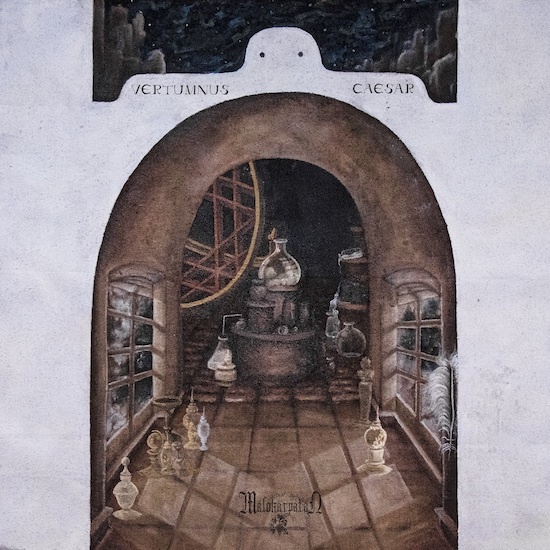
Vertumnus Caesar was released on the 27th of October, and there are a lot of positive reviews as I see. Do you feel that you get some well-deserved recognition? Or do things just go according to plan and you aren’t surprised with all this feedback?
I am basically always surprised by the, so far, continuing positive feedback. As unlike most bands today, I like to take risks with our music and not repeat the same formula ad nauseam. So each time we put a new one out, I either expect our label to drop us or the listeners to proclaim we have sold out or something. It’s a bit of a miracle given how extremely conservative metal fans tend to be. I guess it’s thanks to the fact that despite of our continuous evolution, we never really changed the basic roots of the band. It’s still coming from First Wave Black Metal, just expanding it as far as possible.
Speaking about the First Wave of Black Metal: It happened that I finished a series of retrospective reviews for Mercyful Fate’s discography recently, and it seems that one of the side-effects of this First Wave is a simplistic approach to the lyrics and albums’ concepts which was inherited by many followers. How do you see this issue? Do you try to avoid some of metal’s cliches with your lyrics consciously?
I in fact like simple lyrics. I’m just not very good at writing them myself, as I overthink every word and am very criticial about my writing. I sometimes wish I could write the type of lyrics like Deathhammer do – and I mean that in the most positive sense, as it’s just killer to have song titles like “Total Metal” or “Satan Is Back”.
I think the old metal clichés are great, I just am unable to work that way. I love evil Engrish lyrics from bands like Bulldozer or all the old Brazilian acts. But my approach is more like Celtic Frost. Tom Warrior wasn’t an evil rocking guy who would sing ”Ready to Fucky”, he was more introverted so you’ll see mythology, history or fantasy literature influences in his writing instead. That’s more how I am too, so I’ll rather sing about the court of Emperor Rudolf than about riding motorcycles – as much as I’d enjoy that, but I never rode one.
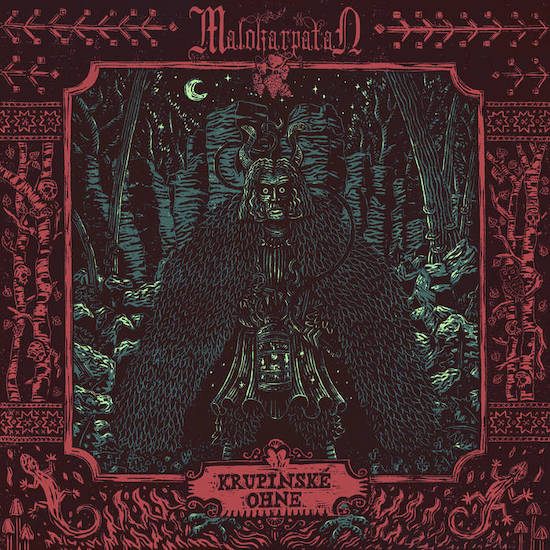
So you finished your “folk horror trilogy” with Krupinské ohne (2020) and I remember that you are fascinated with David Bowie’s ability to record albums differently. What’s new that you wanted to try in Malokarpatan’s new material?
Yeah, although he is not a direct influence in musical terms, I admire his chameleon-like abilities as an artist. Another inspiration in this would be Robert Fripp and all his different phases of King Crimson. What we did with the new one was getting deeper into our ’70s influences, which already started on Krupinské ohne and there were hints before, as even the debut had some subtle moog synthesizer parts.
The older I get, the more I admire ’70s rock and how incredibly inventive it was back then, so it energizes my own approach to music too. But we are also a band of contrasts, so we combine that complexity with a more primitive Venom kind of spirit. I don’t want to become a prog band and neither do I want to sound like Motörhead. Our style dwells in combining those two contrasting ways of making music.
The album was mainly recorded at Hostivař, Prague, but you spent a few years in Sweden. How was everything organized this time?
By the time we entered the studio for Vertumnus Caesar, I’d moved back to Slovakia for over a year. The drums and some percussion, flute and synths were recorded in Sweden though, as our drummer comes from Stockholm and we’ve also had several Swedish guests on the album. It was definitely a clusterfuck at times, as I had to co-ordinate a lot of different people and sometimes force deadlines on them which I don’t enjoy doing, but you have to do that as otherwise your album comes out in 10 years.
I’m extremely happy with all the contributions, they helped to make the album more grandiose and epic. After the Prague studio sessions, there were still different things being added in various home studios because there’s a lot going on everywhere. Then I sent it to Olof Wikstrand of Enforcer, who glued it all together masterfully in the mix.
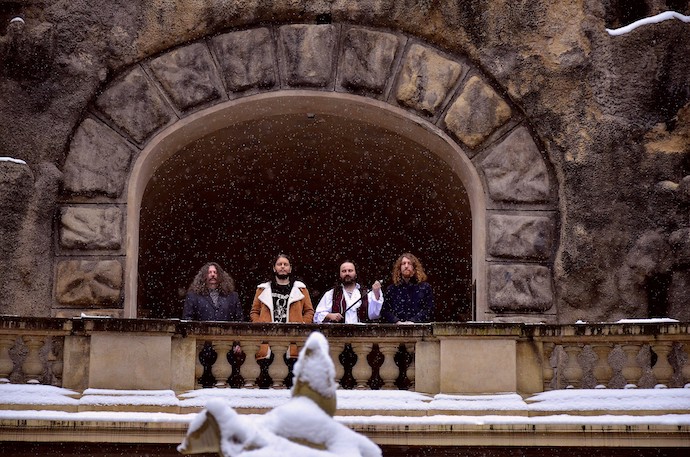
Didn’t you want to take part in the mix, as it seems to be a difficult task to gather all pieces recorded by different people properly in one place? Yet Olof succeeded somehow!
We did the entire mix via texting basically. I told Olof all about my preferences, ideas, etc., and then he’d shape it with all that in mind, while also using his knowledge of mixing which is far greater than mine. It was the easiest collaboration I’ve ever done, he basically did all the ”dirty” work without me even having to ask for it and then the rest was mainly me telling him to put this and that part louder. Usually with other sound engineers, I literally have to fight them verbally to get what I want. He was extremely cooperative and did anything I asked for, only in some very rare cases we did a compromise if he thought some element I asked for is not working with the other sound frequencies.
He also had some valuable advice on the overall flow of the album. Can definitely recommend working with him. What also helped was that this was my overall fourth time working in a real-deal studio, so by this time I had a pretty clear idea for the guitar sound. We tweaked that on the very first recording day in Prague and Olof basically didn’t have to do anything extra with it afterwards.
I see that there were a few guests who took part in the recording of Vertumnus Caesar: Hands of Orlac’s crew, Silenthell from Master’s Hammer, Necrocock himself. I remember that you’re a fan of Master’s Hammer, but what about the other guests? Were Hands of Orlac’s members just nearby when you composed the album?
We invited the Master’s Hammer guys as we’ve been in friendly touch with Silenthell and Necrocock for a bunch of years now and it was a nice symbolic thing, the old guard meeting with… well, young we are not, but there’s definitely a generation gap. It’s of course a huge honour to have them on the album.
I got to know the Hands of Orlac guys during my time in Sweden, because our drummer Axel plays with them. They’re very talented people with great taste in music so we clicked well. Filippo is a total maniac about old Black Hole and Goblin records and he brought that sort of macabre Italian magic to a few of the songs.
There’s also more people, like David Olofsson from Helvetets Port firing up a few masterfully flamboyant solos, or our drummer’s father who did some proper ’70s wurlitzer in the beginning of the final song. All of these people helped to make the record even more colourful.
You said that you personally feel that Malokarpatan’s music is a continuation of the early Czechoslovakian black metal tradition. How much of it is left in Vertumnus Caesar from your point of view?
There’s still a lot I think. Early bands like the Fata Morgana demos were extremely influenced by classic early ’80s metal, and even on later records like ”Bloody Mary” by Tudor, you can hear the influences going back all the way to ’70s rock. When considering the general Central European area, there’s also Tormentor who had hints of ’70s rock even on the 7th Day of Doom demo and went all out with it on the fairly misunderstood Recipe Ferrum album in the early 2000s.
So even when going outside of the more obvious parts with fast drums, dark melodies and raspy vocals, it’s all kinda part of the eccentric way black metal was done here in the old days. It’s a very varied genre, it’s just that there were so many boring copycat bands of the ’90s Norwegian style through the years, people have developed a tunnel vision of the music. You know, an album like Šlágry is part of the local tradition, so there are very few visible borders.
Vertumnus Caesar’s lyrics are based on the story of Rudolf II, Holy Roman Emperor, who was known – to put it simply – for his interest in occultism and fine arts. It’s an interesting and original theme, I’m both surprised and… delighted with such an approach. How did you come to this idea? And did you base the lyrics on Rudolf’s real biography or did you give some freedom to your own imagination?
I’ve explained this in basically every interview for the album, so just a short version: he’s a figure I’ve been obsessed with since early childhood. It’s a bit less of a local topic for us, but he still was a king over our territory as well and an important cultural ”influencer” for the whole Central European region.
I always felt like his complicated persona reminds me of parts of myself – especially his desire to shut the outside world down as much as possible and focus only on his true interests – the arts and the supernatural. The whole mystical atmosphere of old Prague comes from his times and since we always record our albums in that city, his spirit was always sort of floating around.
The lyrics are based on historical facts from several biography books, the only part where fact and folklore have their boundaries blurred is the Golem topic. No one really knows how much of it was fact and fiction, but it’s something that absolutely belongs to the hermetic atmosphere of that place in time so I had to include it. And even those lyrics are based on an actual audience the Rabbi Loew had at Rudolf’s court in February 1592.
Thank you for having enough patience to answer the same question again Adam! Can you name others most frequently asking questions regarding Vertumnus Caesar and Malokarpatan?
Haha no problem! The questions are always about live shows now. Once you stop playing live, it’s what everyone will ask about. I guess we can call it the Darkthrone syndrome!
Besides the new album, you managed to record a few more tracks for the splits with the Dutch black metal band Botulistum and Brazilian Necromante. Was it just an act of friendship? Do you feel yourself a part of a black metal circle if there are any that exist?
The Botulistum split is a heavily delayed affair which was originally meant to be released back in 2015 or 2016, can’t remember exactly. They just didn’t supply their song back then so it was set aside, and many years later Maarten and Jimmy contacted me about it, since we were in friendly touch. I think their fuck-off attitude, anti-music in the vein of classic Abruptum, was a very interesting contrast to our songs, and there was a sort of aesthetic meeting point between our early material and their usual output. We sound more… I guess sophisticated nowadays, but the material around the debut album was, among other things, influenced also by a deeply underground type of ugly black metal.
Regarding Necromante, I’ve also been in friendly touch with them for several years, as I really like their style that reminds me of old Mystifier and other great Brazilian acts, with a touch of Root and Master’s Hammer to it. I think they’re the best ”modern” black metal band in Brazil. So making a release together was a great way of paying homage to both our old national scenes which predate the Norwegian style by a good couple of years. And no, I’ve never been part of any black metal circles. I’m way too individualist and too much of a lonewolf to belong in any cliques.
Finally, you finished the work over your first songs written in the early ’00s and released under the name Stangarigel. You recorded the full-length album Na severe srdca (2022) and the EP Metafyzika barbarstva (2023). How would you summarize this experience? Will you keep Stangarigel active or do you have other priorities?
Yeah well some of the songs on the debut are as old as from the early ’00s, but a few were also new compositions from around 2019-2020 – the second and third track to be exact. Also the Metafyzika Barbarstva mini LP has one song with very old ideas.
It’s a very nostalgic project in general, where I work with my older brother through whom I entered the magical world of metal music way back in the early ’90s as a tiny kid. We pay homage to the classic albums we grew up with (mostly the nordic Second Wave ones), but also try to give it a specific local, Slovakian touch.
I have enough material written for a next full-length, so most likely we will record another one, possibly during the course of next year. I’m just working on new Malokarpatan at the same time, so it can be a bit chaotic. It’s not too difficult to separate the bands though, as Malokarpatan is influenced by all the old pre-Norwegian black metal, while Stangarigel is influenced by the style developed in Norway and surrounding northern countries.
And as you understand, I have to ask if you can reveal any details about the next Malokarpatan album. Can you?
Super hard to tell this time around in fact! I have enough songs for an entire full-length, but I might change some of them for other songs. I also still am not decided on the lyrical concept. I have batches of different lyrics, some of which will probably be used, but I need that extra spark of inspiration to show me the real direction of the album. That always happens at some point, one just has to wait for it. My lyrics are always based in the supernatural, dark sides of folklore and history, I just have a lot of different inspirations so it can be hard to decide which topics to use.
My idea musically is a bit more meat and potatoes album, as I don’t want to keep over-orchestrating forever. It’s like a house of cards and when you put too many of them, it’s going to fall at one point. So probably more guitar-oriented and more aggressive/direct. But that was also my initial aim with Vertumnus Caesar, and see how that went. I think I want to move away from the prog influences a bit and be more like Led Zeppelin in their prime – a loud, guitar-oriented group, but with a lot of extra flavours on top of that, to keep things interesting.
Malokarpatan will celebrate its first decade in 2024. How would you sum up these ten years in the band?
I’m still kind of amazed how popular our music turned out to be, as we are from an obscure country where bands don’t really ”make it”. Despite the fact that we have a worldwide fandom, it’s still on underground levels so it’s all fine either way. I’m proud that we were able to put out four albums during that decade, as a lot of bands take forever to make records nowadays.
I always admired how bands in the ’70s and ’80s would churn out albums each year and almost all of those would be killer. It was a much different situation of course, as the music was making substantial money back then and labels tried to squeeze the bands to death. But it gives me a lot of inspiration and motivation, looking at how much for example Judas Priest have achieved within just a decade.
I hope we can make it into many more decades, as luckily I’m far from running out of ideas so far. I dare to say we brought back a certain approach to black metal (or metal in general) that has been dormant since all styles became so ”totalitarian” (as Fenriz puts it) in the ’90s. Way too many records follow the monotonous Reign in Blood formula, I want to be more like Show No Mercy, or Sad Wings of Destiny.
What are your further plans for Malokarpatan or your other bands and projects?
The plans are making more records. Then, maybe in a few years, we might start doing live shows with Malokarpatan again (definitely not with Stangarigel). I just need to write a more basic album that won’t require several session players in order to be performed live authentically enough. I always follow where the music calls me, so in case the inspiration will stay in more proggy realms, our little ”Sergeant Pepper” era of focusing only on studio work might continue a little longer. But as I see it now, the next chapter will be more rock’n’roll and less moonlit dreamlands.
Thank you for the great interview Adam! I wish you all the best on your way with Malokarpatan, as this quest seems to be quiet a noble endeavor in times like this… however it sounds. So how would you like to finish the interview?
Thank you as well Aleks, been enjoyable! I would like to thank the country of Sweden for the invention of Tunnbrödsrulle and to Larry Hagman for his role of J. R. Ewing.
https://www.facebook.com/malokarpatan?fref=ts
https://malokarpatan.bandcamp.com/

great interview. best of luck to them